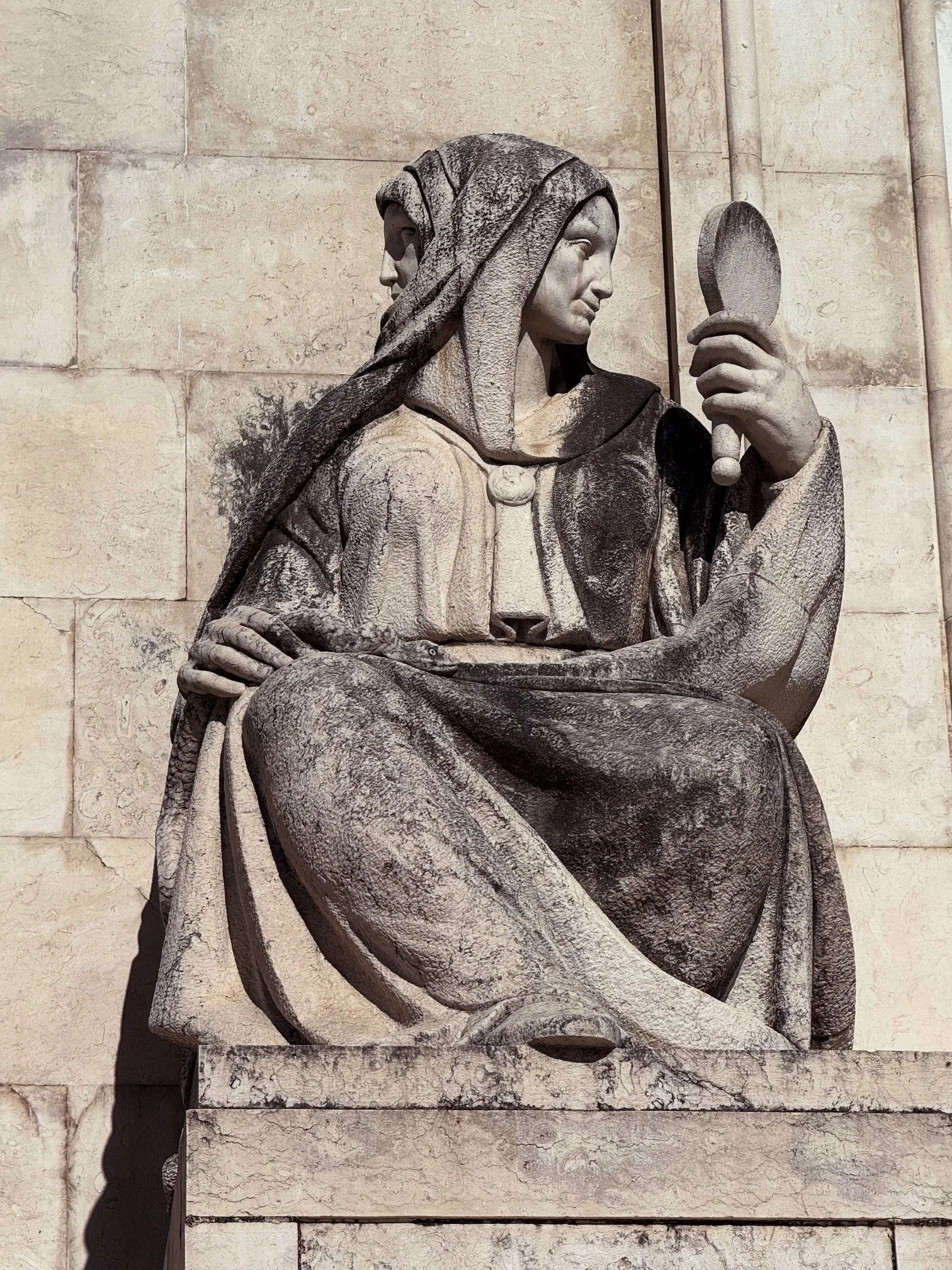Seeing Parliaments as Spaces and Places
Citizen engagement, AI ministers, mascots, and even cookbooks – here’s what’s new in legislative development this month
BY BEATRIZ REY
The Prudence statue at the entrance of the Portuguese Assembly
I spent part of this week at the Portuguese National Assembly collecting data for a project on the challenges of democracy. Every time I visit, I find myself captivated by the statue of Prudence, created by artist Raul Xavier, which stands right in front of the Assembly. It is one of four allegorical figures, together with Justice, Force, and Temperance. Prudence is my favorite because its two faces remind me of how democracy should be approached: trusting institutions while also holding those who occupy them accountable.
That image came back to me as I read the newly released guide Parliament as a Space and Place, produced by INTER PARES and implemented by International IDEA. It is the first in a new series of eight Guides on Citizen Engagement for Parliament, launched on June 30 to coincide with International Day of Parliamentarism. The series, created through a collaboration between the International Parliament Engagement Network (IPEN) and INTER PARES with support from the European Union, covers a wide range of public engagement topics to help parliaments strengthen their connection with citizens.
The Parliament as a Space and Place guide invites us to see parliaments both as “spaces,” meaning rooms, halls, offices, and grounds used for particular purposes, and as “places,” with symbolic and emotional meaning for citizens that varies from person to person. It offers practical advice to MPs and their staff on how to shape these spaces so that parliaments are experienced as meaningful and accessible places that foster understanding and positive associations.
This is the most impressive document on parliaments I have come across this year. It explores different ways to achieve its goals, from making use of the physical parliamentary building to expanding into online platforms, virtual reality, and spaces beyond parliament itself. Last year, I toured Portugal’s House of Parliament, a permanent exhibition of its National Assembly that continues to fascinate me and is highlighted as a positive example in the guide. But there are many others, from Botswana to Ecuador. The document is a reminder that, despite the many flaws of parliaments and the crises confronting democracy, they remain among the most open and approachable institutions, committed to connecting with citizens. I loved it, and I think you will love it too.
Beatriz Rey, Ph.D.
From the US: 2025 Congressional Hackathon
On September 17, Members of the US Congress, institutional staff, civil society advocates, students, technologists, and members of the public gathered at the Capitol Visitor Center for Congressional Hackathon 7.0, an event dedicated to making Congress work better through technology and innovation. Highlights included presentations by high school and college students, the announcement of an agreement with Microsoft to provide 6,000 Copilot licenses for House staff and committees, and the launch of the First Branch legislative data map. Our team at POPVOX Foundation wrote more about the event.
The Latest on AI
Dr. Martin Kamprath, an expert on digitalization and deep tech at the German Bundestag, presents the AI Cloverleaf Model, a framework to map AI use cases across legislation, support services, and internal administration. Featured in the Inter-Parliamentary Union’s Innovation Tracker, the model helps parliaments prioritize applications and uncover hidden potentials. Kamprath invites other legislatures to engage with the methodology and build a shared approach to AI in parliamentary work.
The Swiss Parliament is piloting AI to improve how parliamentary business is indexed and searched across German, French, and Italian. One project uses machine learning for automatic topic tagging, while another develops a Retrieval Augmented Generation (RAG) system with user feedback. Both highlight that staff value recall over precision, pointing to practical ways AI can enhance transparency and access in democratic institutions.
Albania’s Prime Minister Edi Rama has announced a first-of-its-kind cabinet appointment: Diella, an artificial intelligence “minister” tasked with overseeing public funding projects and tackling corruption in public tenders. Launched earlier this year as a virtual assistant on the e-Albania platform, Diella is now being elevated to the political stage as part of Rama’s new government.
Other Legislative News
Peru’s Congress has introduced a new institutional mascot, Congresito, designed to help bring citizens closer to the legislature.
Meanwhile, legislatures from Canada to Northern Ireland, France, and the US have turned to the kitchen – publishing cookbooks that raise funds for charity and showcase the human side of politics. Charlie Feldman, former President of the Canadian Study of Parliament Group (and a self-professed terrible cook), explores how these culinary experiments remind us that parliaments connect with citizens not only through bills and debates, but also through food.
Events
October 1-3: Athens Democracy Forum (Athens, Greece)
October 7-9: Open Government Partnership Summit (Vitoria-Gasteiz, Spain)
October 6-12: 68th Commonwealth Parliamentary Conference (Bridgetown, Barbados)
Modern Parliament (“ModParl”) is a newsletter from POPVOX Foundation that provides insights into the evolution of legislative institutions worldwide. Learn more at modparl.substack.com.

